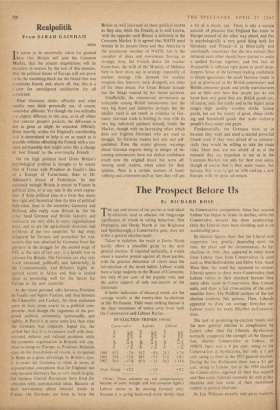Realpolitik
From SARAH GAINHAM
BONN
T seems to be universally taken for granted here that Britain will join the Common Market, that the present negotiations will be ,complete in essence by the end of this summer, that the political future of Europe will not prove in be the stumbling-block for the Island that was s.'metimes feared, and, above all, that this is a r. atter for unmitigated satisfaction for all an cerned.
What Germany thinks officially and what smaller men think personally are, of course, somewhat different. Yet though the two attitudes .1:.e slightly different in this case, as in all others that concern people's pockets, the difference is not so great as might be expected. Officially ,Bonn heartily wishes for England's membership and is determined to help it on as much as is possible without offending the French with a too- open partisanship that might seem like a change of 'best friends' to the ever-touchy French.
On the high political level Grcat Britain's PsychOlogical position is thought to be nearer that of France 'with President de Gaulle's idea of a ' Europe of Fatherlands, than to Dr. Adenauer's dream of Federation. So that curiously enough Britain is nearer to France in political aims, or at any rate in the overt expres- sion of those political aims in a form that seems less rigid and theoretical than the idea of political federation, than to the countries, Germany and Holland, who really want Britain' in. On the other hand German and British industry and commerce are very alike in many organisational ways, and so are the agricultural situations and problems of the two countries. So that every safegOard for farmers and protection for con- sumers that was obtained by Germany from her partners in the struggle for the second stage, of EEC at the turn of last year, is a benefit won in advance for Britain. The Germans are also very much interested, politically and industrially, in the Commonwealth, and Britain's highly re- spected record in Africa and Asia is looked upon as promising well for the future for Europe in the new countries.
In the recent personal talks between President de Gaulle and Signor Fanfani, and then between the Chancellor and Fanfani, the three statesmen seem to have come nearer to a political com- promise. And though the vagueness of the pro- posed political community (presumably and rightly, in Paris) is in some sense less than what the Germans had originally hoped for, the settled fact that -it is to concern itself with inter- national, defence and cultural problems while the economic organisation in Brussels will con- tinue to integrate Europe, as Professor Hallstein says, on the foundations of reason, is recognised in Bonn as a great advantage in Britain's eyes. It is easier for Germany to think in terms of supranational conceptions than for England; not only because Germany has so very much to gain, but because Central Europeans have lived for centuries with supranational ideas. Because of their nervousness about internal trends in France, the Germans are keen to keep the British as well informed of these political moves as they can, while the French, as is well known, wish the opposite until Britain is definitely in the Common Market. It is agreed that NATO must remain in its present form and that America is the paramount member of NATO; but in the complex of ideas and movements flowing so strongly here, the French desire for nuclear know-how, the wish of the Ministry of Defence here to have more say in strategy. especially of nuclear strategy (the demand for nuclear weapons has, however, been dropped), are some of the chess pieces. For Great Britain already has the things wanted by her future partners.
Unofficially, the commercial nervousness so noticeable among British businessmen (not the very big firms and industries perhaps, but the smaller men) is not much in evidence in Ger- many. German trade is holding its own with its two big industrial partners already inside the Market, though with an increasing effort which does not frighten Germans who are used to struggle. So German traders feel safe and self- confident. Even the recent gloomy warnings about German exports being in danger of be- coming uneconomic have not shaken confidence much now the original shock has worn off. Among small .traders, when asked for their opinion, there is, a certain amount of hand- rubbing and comments such as 'now they will get a bit of a shock, too.' There is also a certain amount of pleasure that England has come to Europe instead of the other way about, and this is psychologically a very good thing both for Germany and France—it is historically and emotionally important that the two nations that defeated each other should have started to make a unified Europe together; and this fact of Realpolitik is reflected right down to small shop- keepers. Some of the German trading confidence is simple ignorance; the small German trader is just as provincial as his British counterpart and British consumer goods and textile manufactures are so little seen here that people just do not know how very good they are. British goods are, Of course, seen. but rarely and in the higher price ranges—high quality woollen cloths, luxury goods, but not the variety of good, cheap cloth- ing and household goods that make ordinary people's lives easier and gayer.
Fundamentally, the Germans want us in because they want and need a second powerful friend; even if they were afraid of us commer- cially they would be willing to take the trade risks. Since they are not afraid of us at the moment they are impatient to see us in the Common Market, not only for their own sakes, though of course that is their main reason, but because they ■% ant to get on with making a new Europe. with the great adventure.














































 Previous page
Previous page